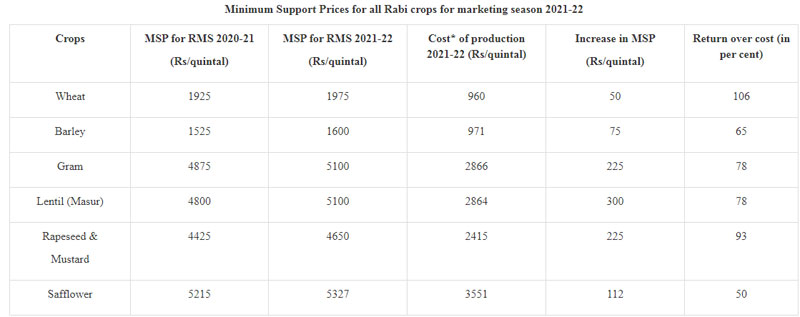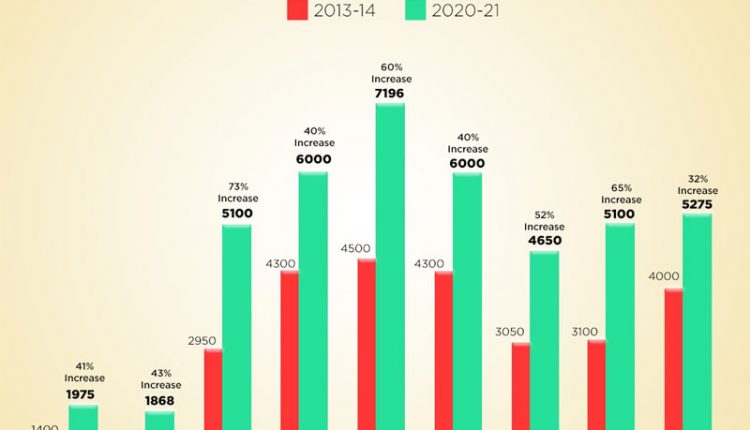New Delhi/Kalinga Voice
The Cabinet Committee on Economic Affairs (CCEA) chaired by the Prime Minister Shri Narendra Modi has approved the increase in the Minimum Support Prices (MSPs) for all mandated Rabi crops for marketing season 2021-22. This increase in MSP is in line with the recommendations of the Swaminathan Commission.
In view of nutritional requirements and changing dietary pattern and to achieve self-sufficiency in pulses and oilseeds production, the Government has fixed relatively higher MSP for these crops.
The highest increase in MSP has been announced for lentil (Rs. 300 per quintal) followed by gram and rapeseed & mustard (Rs. 225 per quintal each) and safflower (Rs. 112 per quintal). For barley and wheat, an increase of Rs. 75 per quintal and Rs 50 per quintal respectively has been announced. The differential remuneration is aimed at encouraging crop diversification.

*Includes all paid out costs such as those incurred on account of hired human labour, bullock labour/machine labour, rent paid for leased in land, expenses incurred on use of material inputs like seeds, fertilizers, manures, irrigation charges, depreciation on implements and farm buildings, interest on working capital, diesel/electricity for operation of pump sets etc, miscellaneous expenses and imputed value of family labour.
The increase in MSP for Rabi Crops for marketing season 2021-22 is in line with the principle of fixing the MSPs at a level of at least 1.5 times of the All-India weighted average Cost of Production as announced in Union Budget 2018-19. The expected returns to farmers over their cost of production are estimated to be highest in case of Wheat (106%) followed by rapeseed & mustard (93%), gram and lentil (78%). For barley, return to farmers over their cost of production is estimated at 65% and for safflower, it is 50%.
Support is in the form of MSP as well as procurement. In the case of cereals, Food Corporation of India (FCI) and other designated State Agencies would continue to provide price support to the farmers. Government has set up a buffer stock of pulses and domestic procurement of pulses is also being done under Price Stabilization Fund (PSF).
The Umbrella Scheme “Pradhan Mantri AnnadataAaySanraksHan Abhiyan” (PM-AASHA), comprising Price Support Scheme (PSS), Price Deficiency Payment Scheme (PDPS), and pilot Scheme of Private Procurement and Stockist Scheme (PPSS) will aid in procurement of pulses and oilseeds.
Despite global COVID-19 pandemic and consequent nationwide lockdown, timely intervention made by Government has led to an all-time record procurement of wheat at about 39 million tonnes for RMS 2020-21. Around 43 lakh farmers[1] benefitted under procurement operations period which is 22 percent higher than the RMS 2019-20. In 2019-20, 390 lakh tonnes of wheat is estimated to be procured, while in 2014-15, 280 lakh tonnes was procured. In 2019-20, 15 lakh metric tonnes of pulses is estimated to be procured, while in 2014-15, 3 lakh tonnes was procured. In 2019-20, 18 lakh metric tonnes of oilseeds is estimated to be procured, while in 2014-15, 12 thousand metric tonnes was procured.
In the current situation of health pandemic, all concerted efforts are being made by the Government to alleviate the problems faced by the farmers, various steps taken by the Government are as follows:
- Along with increase in MSP, procurement process has been strengthened so that maximum number of farmers may get its benefit.
- Procurement centres for wheat and for pulses-oilseeds are increased by 1.5 times and 3 times respectively during Covid pandemic.
- During pandemic 390 lakh tons of wheat has been procured at a cost of Rs.75,000 crore which is 15 percent more than the last year.
- With the initiation of PM KISAN SAMMAN NIDHI YOJANA around 10 crore farmers have benefitted. Total disbursed amount is around Rs.93,000 crore
- Nearly 9 crore farmers have received around Rs.38000 crore during Covid pandemic under PMKISAN.
- 1.25 Crore new KCCs have been issued in the last 6 months.
- vii. Summer Season sowing is 57 lakh hectare, which is 16 lakh hectare more than the last year. Kharif sowing is also 5 percent higher than that of last year.
- Number of E-NAM markets has increased from 585 to 1000 during Covid pandemic. Last year, e-platform witnessed trade of Rs. 35000 crore.
- Rs. 6850 crore will be spent for creation of 10,000 FPOs over the period of five years.
- In the last 4 years under FASAL BIMA YOJANA, farmers received a claim of Rs.77,000 crore against paid premium of Rs. 17500 Crore.
- FASAL BIMA YOJANA is made voluntary.
- xii. Kisan Rail has been started.
The Farmers’ Produce Trade and Commerce (Promotion and Facilitation) Ordinance, 2020 and The Farmers (Empowerment and Protection) Agreement on Price Assurance and Farm Services Ordinance, 2020 have been promulgated so as to provide alternative channels for farmers to sell their produce outside traditional APMC mandi system and to encourage private participation in agribusiness. The Essential Commodities (Amendment) Ordinance, 2020 has been promulgated to build efficient agri-food supply chains and attract more private sector investment in value-addition, scientific storage, warehousing and marketing infrastructure.
Under the Scheme for Agriculture Infrastructure Fund, Rs 1 Lakh Crore will be provided by the banks and financial institutions as loans with interest subvention of 3% per annum and credit guarantee coverage under CGTMSE (Credit Guarantee Fund Trust for Micro and Small Enterprises) for loans up to Rs. 2 Crore. The scheme will support farmers, PACS, FPOs, agri-entrepreneurs, etc. in building community farming assets and post-harvest agriculture infrastructure.

